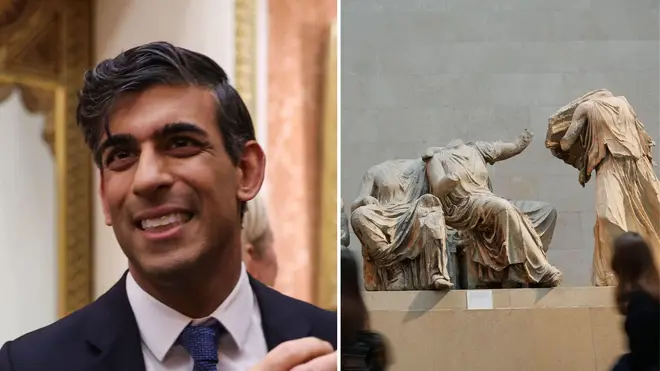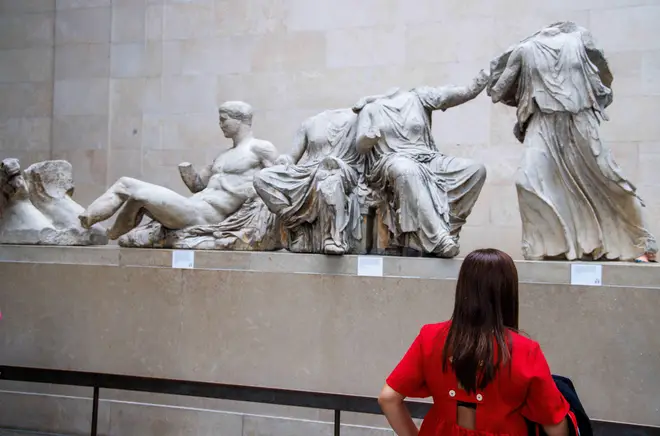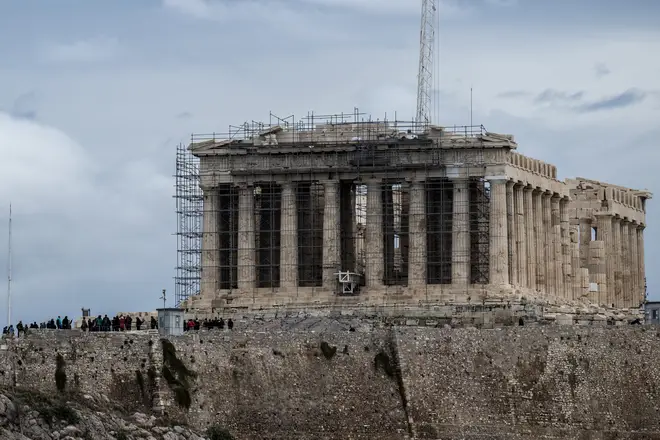
Tonight with Andrew Marr 6pm - 7pm
28 November 2023, 23:33 | Updated: 29 November 2023, 12:43

Rishi Sunak has been accused of being "disrespectful... to the Greek people" after he snubbed the country's prime minister over the Elgin Marbles row.
Senior figures in Athens escalated a war of words after No10 cancelled his meeting with Kyriakos Mitsotakis, who had described the situation with the Parthenon artefacts as like the Mona Lisa being ripped in half.
Senior ministers said Sunak had done it because the Tories are "in a bind" over bad polling, while Downing Street said the Greeks had given assurances they would not use publicity surrounding the trip to advance calls for them to be returned.
Mitsotakis was instead offered a meeting with Oliver Dowden, the deputy PM, which he declined.
Giorgos Gerapetritis, the Greek foreign minister, said: "This is unheard of. It is a massive diplomatic indiscretion. Even Israel and Hamas communicate."
Tassos Hadjivassiliou, an aide to Sunak, said: "It is clear that Sunak is in a bind, under pressure ahead of the upcoming elections and that pressure led him to this diplomatic transgression."
Downing Street had earlier accused Greece of focusing on "ancient grievances".
Greece has called for the famous Elgin Marbles, which were taken from the Parthenon in Athens hundreds of years ago, to be returned to Greece from the British Museum.
The British government has said that the marbles will not be returned, and the issue is "not a pressing concern" to the British or Greek people. A law forbids the British Museum from giving away items in its collection.
Downing Street claimed the Greek government had "provided reassurances" that they would not use the visit of Mr Mitsotakis as a public platform. Greece are understood to have denied making these reassurances.

"Those assurances was not adhered to," a spokesperson said. "We want to focus on challenges that affect people right now rather than ancient grievances."
Discussions over returning the marbles would have "cast a shadow" on the other meetings due to be held and it was "best to have those in private", they said.
Downing Street also ruled out loaning the marbles to Greece, "without Greece accepting the Museum are the legal owners" adding that the issue was "long settled".
Mitsotakis had been due to meet Sunak on Tuesday. But the meeting was axed after he called for the Marbles to be returned to Greece from the British Museum.

Transport Secretary Mark Harper on the Elgin Marbles
A spokesman for his office said: "The prime minister is disappointed that Prime Minister Sunak cancelled their bilateral meeting at the 11th hour today.
"Greece and Britain have a very deep history of friendship and cooperation, and the Greek government is extremely surprised by this decision.
"The prime minister was looking forward to discussing a range of topics of mutual interest including the Israel-Gaza conflict, Russia's illegal invasion of Ukraine, climate change, as well as common challenges such as migration, and of course the Parthenon Sculptures."

The Elgin Marbles - also known as the Parthenon Marbles - are 2,500-year-old sculptures that Lord Elgin took from Athens and sold to the British government in 1816.
Lord Elgin's venture has been debated for more than 200 years. Some say that the Marbles were not being properly looked after on the Parthenon, and they are safer in the British Museum.
The museum said Lord Elgin's actions "were thoroughly investigated by a Parliamentary Select Committee in 1816 and found to be entirely legal, prior to the sculptures entering the collection of the British Museum by Act of Parliament."
The 1963 British Museum Act forbids the museum from giving away items in its collection, apart from under limited conditions.

The Marbles formed a 520ft frieze that ran around the outer walls of the Parthenon.
Carved between 447-432 BC, the frieze and other sculptures remained largely intact until the temple was partially blown up during a siege in 1687. The Parthenon was being used as a gunpowder store at the time by a Turkish garrison.
Greece formally requested the Marbles' return in the early 1980s. Calls for the artefacts' repatriation have become louder in subsequent decades.
A Greek official claimed earlier this year that their government had been in talks with the British Museum over the temporary return of the marbles.
The official said: "We are working on a broad and lengthy cultural agreement that would include an interchange and rotation of historical artefacts between Greece and the British Museum."
The museum said it has never received a loan request for the Marbles.